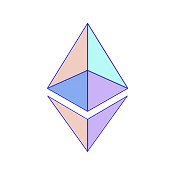In the realm of blockchain technology, understanding the nuances between decentralized staking platforms like Rocket Pool and the foundational network of Ethereum can empower investors and developers alike to make informed decisions. While Ethereum stands as the backbone of decentralized applications, Rocket Pool introduces innovative ways to democratize staking and liquidity in the Ethereum ecosystem. This blog explores their core technologies, security features, and how they serve different roles within the blockchain landscape, providing a comprehensive comparison for crypto enthusiasts seeking depth and clarity.
Short on time? Jump to Rocket Pool vs Ethereum Comparison
Understanding Rocket Pool and Ethereum ?
Rocket Pool is a decentralized Ethereum 2.0 staking protocol that allows users to participate with as little as 16 ETH, contrasting with Ethereum's requirement of 32 ETH for running a validator. It leverages smart contracts and pledge nodes to facilitate staking, rewards, and liquidity, emphasizing decentralization and community governance. Ethereum, on the other hand, is a blockchain platform that transitioned from Proof-of-Work to Proof-of-Stake with 'The Merge,' aiming to improve energy efficiency, scalability, and security. It serves as a foundation for decentralized applications, DeFi, NFTs, and more, representing the broader ecosystem that Rocket Pool operates within.
Rocket Pool's architecture involves smart contracts managing pledge nodes and pools, with a focus on security through audits and pledge insurance. Its core advantage lies in lowering participation barriers and promoting decentralization via a community-governed DAO. Ethereum's architecture comprises layers including the peer-to-peer network, consensus layer, data layer, execution layer, and application layer, supporting a diverse ecosystem of dApps and Layer 2 solutions designed to enhance scalability and reduce transaction costs.
The transition to Ethereum 2.0 and the implementation of sharding and Layer 2 solutions aim to address scalability issues, while Rocket Pool continues to innovate within the staking space by offering liquidity tokens and high decentralization. Both entities are pivotal in shaping the future of blockchain technology—Ethereum as a versatile platform and Rocket Pool as a specialized protocol enhancing Ethereum's staking landscape.
Understanding their technological foundations and strategic roles helps users appreciate how each contributes to the broader blockchain ecosystem, whether through securing the network via staking or enabling developers to deploy decentralized applications efficiently.
Key Differences Between Rocket Pool and Ethereum
Participation Requirements
- Rocket Pool: Rocket Pool lowers the barrier to entry for staking with a minimum of 16 ETH, allowing more users to participate in Ethereum 2.0 staking without needing to meet the 32 ETH validator requirement. This democratization fosters greater decentralization and inclusivity within the staking community.
- Ethereum: Ethereum itself requires a full 32 ETH to run a validator node, making it less accessible for individual stakers and smaller investors. This requirement often necessitates pooling or delegation, which can introduce trust issues and centralization risks.
Core Functionality
- Rocket Pool: Rocket Pool functions primarily as a decentralized staking protocol that enables users to stake ETH, earn rewards, and maintain liquidity through the rETH token. Its architecture emphasizes community governance and security, with pledge nodes and insurance mechanisms.
- Ethereum: Ethereum is a blockchain platform that supports the deployment of smart contracts and decentralized applications. Its primary function is to serve as a global, decentralized computation platform, with staking as a means to secure the network and facilitate economic activity.
Decentralization Focus
- Rocket Pool: Rocket Pool is designed to maximize decentralization by allowing anyone to run pledge nodes and participate in governance via its DAO. Its distributed architecture minimizes reliance on centralized operators, fostering a more resilient network.
- Ethereum: Ethereum's decentralization depends on a broad network of nodes and validators, but the high entry barrier for validators can lead to centralization risks. The network's security and decentralization are maintained through its consensus and governance mechanisms, but validator concentration remains a concern.
Liquidity and Trading
- Rocket Pool: Rocket Pool offers rETH tokens that are tradeable and can be utilized within DeFi ecosystems, providing liquidity and flexibility during the staking period. This liquidity feature is a key advantage for users seeking to maintain market exposure.
- Ethereum: Ethereum, as a blockchain, does not inherently provide liquidity features but supports a vast ecosystem of tokens, including stablecoins, NFTs, and DeFi tokens. Liquidity is managed through various platforms and Layer 2 solutions built on top of Ethereum.
Security Measures
- Rocket Pool: Rocket Pool employs extensive security protocols, including code audits, pledge insurance, and DAO governance, to safeguard user funds and ensure protocol integrity. These measures aim to mitigate risks associated with node failures or malicious behavior.
- Ethereum: Ethereum’s security is rooted in its Proof-of-Stake consensus and extensive network of validators. It undergoes rigorous security audits and community oversight, with ongoing upgrades to enhance resilience against attacks.
Rocket Pool vs Ethereum Comparison
| Feature | ✅ Rocket Pool | ✅ Ethereum |
|---|---|---|
| Minimum Staking Amount | 16 ETH | 32 ETH |
| Core Function | Decentralized staking protocol with liquidity tokens | Blockchain platform supporting smart contracts and dApps |
| Decentralization Focus | High; community-governed node operation | Moderate; validator concentration risk exists |
| Liquidity Token | rETH, tradeable within DeFi | Various tokens and assets on the ecosystem |
| Security Measures | Audits, pledge insurance, DAO governance | Proof-of-Stake security, network audits |
Ideal For
Choose Rocket Pool: Individuals seeking accessible, decentralized ETH staking with liquidity options and community governance.
Choose Ethereum: Developers and users leveraging Ethereum’s platform for decentralized applications, DeFi, and NFTs while participating in staking for network security.
Conclusion: Rocket Pool vs Ethereum
Rocket Pool and Ethereum serve interconnected but distinct roles within the blockchain universe. Rocket Pool enhances Ethereum's staking ecosystem by lowering participation barriers and emphasizing decentralization, liquidity, and security through innovative smart contract design and governance. Meanwhile, Ethereum remains the foundational layer for a vast array of decentralized applications, smart contracts, and token standards, continually evolving through upgrades like sharding and Layer 2 solutions to meet scalability demands.
Choosing between Rocket Pool and Ethereum depends on user goals—whether it's participating in secure, decentralized staking with liquidity or deploying and interacting with decentralized applications at scale. Both are critical to the ecosystem’s growth, complementing each other to foster a more open, scalable, and resilient blockchain future.






